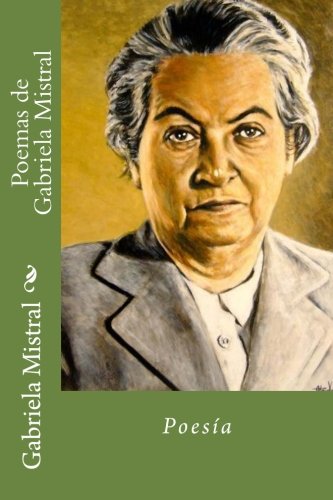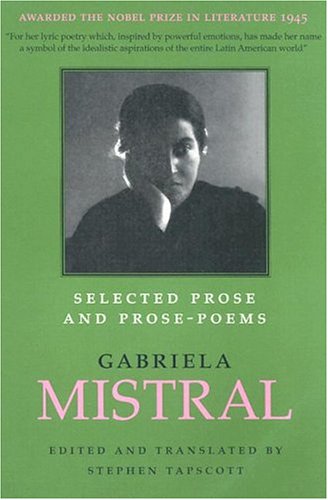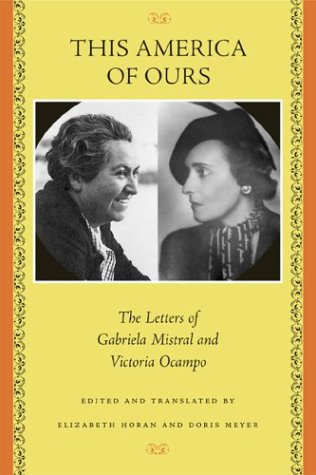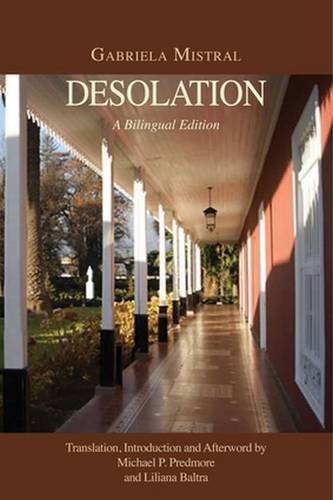Background
Gabriela Mistral was born Lucila Godoy Alcaya on April 6, 1889, at Vicuna, a small town in northern Chile. Her parents were schoolteachers, but her father abandoned the family when she was 3.



(El 12 de diciembre de 1914 obtuvo el primer premio en el ...)
El 12 de diciembre de 1914 obtuvo el primer premio en el concurso de literatura de los «Juegos Florales» organizados por la FECh en Santiago, por sus Sonetos de la muerte. Desde entonces utilizó el seudónimo literario «Gabriela Mistral» en casi todos sus escritos, en homenaje a dos de sus poetas favoritos, el italiano Gabriele D'Annunzio y el francés Frédéric Mistral. En 1917, Julio Molina Núñez y Juan Agustín Araya publicaron una de las más importantes antologías poéticas de Chile, Selva lírica, donde Lucila Godoy aparece ya como una de las grandes poetas chilenas. Esta publicación es una de las últimas en que utiliza su nombre verdadero. Desempeñó el cargo de inspectora en el Liceo de Señoritas de La Serena. Además, como destacada educadora, visitó México, Estados Unidos y Europa estudiando las escuelas y métodos educativos de estos países. Fue profesora invitada en las universidades de Barnard, Middlebury y Puerto Rico.
http://www.amazon.com/gp/product/1514348721/?tag=2022091-20

( The first Latin American to receive a Nobel Prize for L...)
The first Latin American to receive a Nobel Prize for Literature, the Chilean writer Gabriela Mistral (1889-1957) is often characterized as a healing, maternal voice who spoke on behalf of women, indigenous peoples, the disenfranchised, children, and the rural poor. She is that political poet and more: a poet of philosophical meditation, self-consciousness, and daring. This is a book full of surprises and paradoxes. The complexity and structural boldness of these prose-poems, especially the female-erotic prose pieces of her first book, make them an important moment in the history of literary modernism in a tradition that runs from Baudelaire, the North American moderns, and the South American postmodernistas. It's a book that will be eye-opening and informative to the general reader as well as to students of gender studies, cultural studies, literary history, and poetry. This Spanish-English bilingual volume gathers the most famous and representative prose writings of Gabriela Mistral, which have not been as readily available to English-only readers as her poetry. The pieces are grouped into four sections. "Fables, Elegies, and Things of the Earth" includes fifteen of Mistral's most accessible prose-poems. "Prose and Prose-Poems from Desolación / Desolation 1922" presents all the prose from Mistral's first important book. "Lyrical Biographies" are Mistral's poetic meditations on Saint Francis and Sor Juana de la Cruz. "Literary Essays, Journalism, 'Messages'" collects pieces that reveal Mistral's opinions on a wide range of subjects, including the practice of teaching; the writers Alfonso Reyes, Alfonsina Storni, Rainer Maria Rilke, and Pablo Neruda; Mistral's own writing practices; and her social beliefs. Editor/translator Stephen Tapscott rounds out the volume with a chronology of Mistral's life and a brief introduction to her career and prose.
http://www.amazon.com/gp/product/0292752660/?tag=2022091-20

( Winner, Best Book Translation Prize, New England Counci...)
Winner, Best Book Translation Prize, New England Council of Latin American Studies, 2005 Gabriela Mistral and Victoria Ocampo were the two most influential and respected women writers of twentieth-century Latin America. Mistral, a plain, self-educated Chilean woman of the mountains who was a poet, journalist, and educator, became Latin America's first Nobel Laureate in 1945. Ocampo, a stunning Argentine woman of wealth, wrote hundreds of essays and founded the first-rate literary journal Sur. Though of very different backgrounds, their deep commitment to what they felt was "their" America forged a unique intellectual and emotional bond between them. This collection of the previously unpublished correspondence between Mistral and Ocampo reveals the private side of two very public women. In these letters (as well as in essays that are included in an appendix), we see what Mistral and Ocampo thought about each other and about the intellectual and political atmosphere of their time (including the Spanish Civil War, World War II, and the dictatorships of Latin America) and particularly how they negotiated the complex issues of identity, nationality, and gender within their wide-ranging cultural connections to both the Americas and Europe.
http://www.amazon.com/gp/product/0292705409/?tag=2022091-20

( This is the first bilingual translation into English of...)
This is the first bilingual translation into English of an important work by Gabriela Mistral, one of the premier Latin American poets of the 20th century and the first Latin American author to receive the Nobel Prize in Literature. For the first time, it allows English readers to appreciate the integrity and expressive power of this foundational book in the life and works of Gabriela Mistral. The translation is based on the most reliable and accurate text in Spanish, the 1923 edition of Nascimento, which will be of interest and importance both to a Spanish-speaking public as well as to specialists in the field.
http://www.amazon.com/gp/product/1891270249/?tag=2022091-20
Gabriela Mistral was born Lucila Godoy Alcaya on April 6, 1889, at Vicuna, a small town in northern Chile. Her parents were schoolteachers, but her father abandoned the family when she was 3.
Gabriela was tutored by her mother and a stepsister, also a teacher.
She began instructing in 1904, achieving success in numerous high schools. In 1922 the Mexican minister of education, Jose Vasconcelos, invited her to assist in his reform program. In 1925 she retired but remained active.
Gabriela Mistral devoted much time to diplomatic activity, serving as honorary consul at Madrid, Lisbon, Nice, in Brazil, and at Los Angeles. She also served as a representative to the League of Nations and the United Nations. In fulfillment of these responsibilities, she visited nearly every major country in Europe and Latin America. She also continued her early literary pursuits. First literary recognition came in 1914 with Sonnets on Death (Sonnets de la muerte). The suicide in 1909 of her first love occasioned the poem, and shortly afterward her second love married someone else, causing her early poetry to reflect personal anguish. In 1922 Gabriela Mistral's first book, Desolation (Desolación), a collection of poems previously published in newspapers and magazines, was released through the efforts of Federico de Onís, Director of the Hispanic Institute of New York. Motherhood, religion, nature, morality, and love of children are present with an overriding theme of personal sorrow. Thus, her international reputation was established. Two years later her second book, Tenderness (Ternura), appeared; it contained some of the poems from Desolation and several new ones. Fourteen years passed before the next, Felling (Tala), appeared. It was much happier in tone, containing among other themes American scenes, "lullabies" for children, and a metaphysical acceptance of death - all written in a much more polished style than that of the works previously noted. Her last book, Wine Press (Lagar), in 1954, dealt with most of the subjects previously treated but in a different manner. The winning of the Nobel Prize for literature in 1945 did not assuage the loss by suicide of her nephew, adopted and raised as her son, and of her good friends Stefan Zweig and his wife. Furthermore, by 1944 she had developed diabetes. The tone of much of her last poetry was that of one patiently awaiting death with complete faith in God. Gabriela Mistral went to the United States for medical aid in 1946, living in various locales and, after her appointment to the United Nations, moving to Long Island. It was there that she died of cancer on January 10, 1957.
In 1923 she was awarded the Chilean title "Teacher of the Nation. " Critics marked her poetry - direct and simple without adornment - as a turn from modernism in Latin America. Her poetry earned her the Nobel Prize for literature in 1945, making her the first Latin American author to receive it.
( The first Latin American to receive a Nobel Prize for L...)
( This is the first bilingual translation into English of...)
( Winner, Best Book Translation Prize, New England Counci...)
(El 12 de diciembre de 1914 obtuvo el primer premio en el ...)
(Undécima edición, 1983. 172 páginas)
Teacher of the Nation
